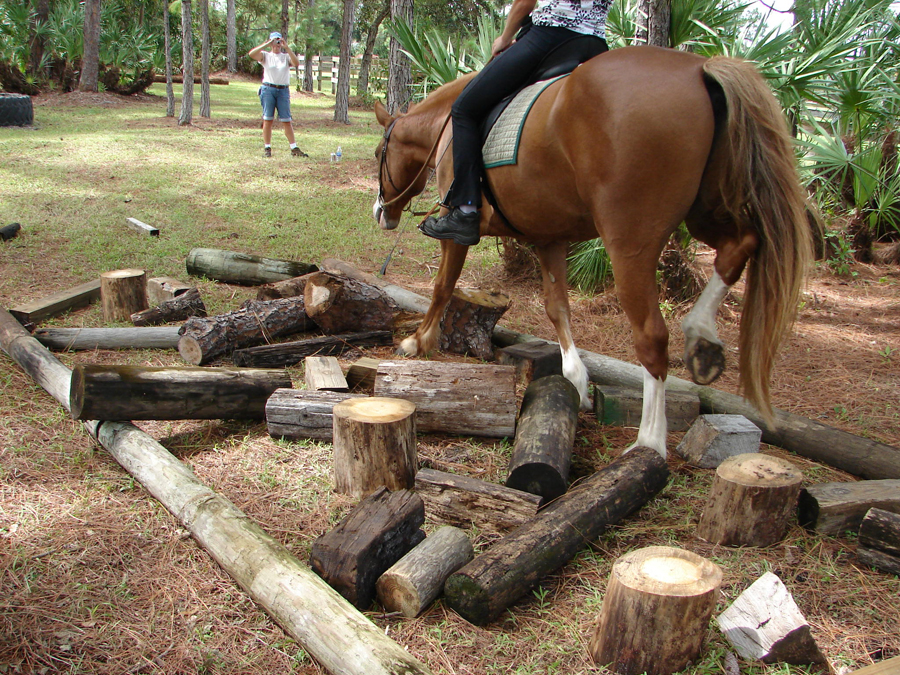Tips for Teaching this Mountain Trail Horse Skill
by Mark Bolender

Whether out on a trail or in a show, watching an accomplished Mountain Trail horse moving through a difficult log obstacle makes it look easy. The horse navigates the logs while going forward boldly and confidently, and always advancing safely. We begin training for log obstacles from the ground.
Start with a few simple logs and ask your horse to inspect them. It will probably drop its head to consider this new obstacle. Since each horse is different you must be flexible, so let your horse get comfortable before asking it to step over. This may take a while because most horses would rather avoid the obstacle than step over it. Your horse will soon understand that you expect it to concentrate on the obstacle and step over it rather than go around it. You should reward the slightest try when it moves forward.
Usually a horse concentrates on an obstacle by pawing, chewing on it, snorting, etc. Whatever its preference, allow it to investigate, without pressure, while it’s thinking. Also, do not let your horse linger or lounge by the logs because it should not desensitize to them. Desensitization is useful in certain circumstances, but not with logs because it does not teach the animal to think its way through this obstacle. When a horse has to “think it through” to navigate a log obstacle, it fosters boldness and confidence much faster.
While you ask your horse to inspect the logs do not move your feet. It may be hard to resist this urge but by doing so you use a very powerful leadership tool. This is because a horse’s instinct tells it that the more you move, the more it should not trust you. Being immovable and not intimidated is how the alpha mare behaves when she makes a request. When you (or the alpha mare) shows foot movement, it telegraphs to the horse that you’re not worthy of leadership in the herd.
Each horse requires a different level of pressure, so when you allow your horse to inspect the logs, be patient. Give your horse all the time it needs to think as it takes its first step over the logs. Be prepared for the horse to drop a shoulder into you (which is when the horse moves into your personal space) so it can exit the logs. Put enough pressure on the horse so it moves away from you and out of your space. Each creature has such a personal space and with horses and people, I call it a “Bolender Bubble.” When you and your horse’s “Bolender Bubble” intersect, it can cause your horse to panic. So if you find that your horse is getting too close to you, put the horse back on track to think its way through the logs. Remember, if you put too much pressure on your horse it will jump instead of walk and that can be dangerous.
I prefer to teach a horse on a few logs first and gradually build up to approximately eight logs. At that point it should be able to walk over any size log in a straight line and without jumping. It’s also helpful to put a cone at each end of the obstacle in order to keep you and your horse focused on what is straight. Soon your horse will walk up to a log obstacle, drop its head, and move through with style and grace. When this happens it’s time to mount up and ride.
The same training steps used in ground work apply when riding. Take your time and start with just a simple set of logs. A key to riding is to trust your horse on a loose rein. If you tighten up and pull on its face, you’re building a trap (at least in the horse’s mind), and that causes it to bolt or jump the logs. It’s critical that you trust your horse to make the navigation decisions. In time, your horse will walk through on a loose rein, showing that its confidence and trust is in you.
Happy trails and Bolender Blessings!
Published in April 2012 Issue

Mark Bolender is the nation’s leading expert in Mountain Trail, Extreme Mountain Trail, and Competitive Trail. He’s a three-time National Champion and one of the most popular trainers in the country. Today, Mark’s unique style of horsemanship has made the Bolender brand synonymous with these disciplines.
Mark has written for numerous national magazines and authored the popular book, Bolender’s Guide to Mastering Mountain and Extreme Trail Riding. Mark and his horse Checkers hold the sport’s all-time highest honors. Checkers was distinguished by becoming the 2020 Breyer Horse.
Mark and Lee Bolender founded the International Mountain Trail Challenge Association (IMTCA) to promote these sports. Today, the IMTCA trains judges, coordinates activities, and maintains certifications around the world.
Mark owns and operates Bolender Horse Park in Washington State. Mark has also designed and built Mountain Trail courses around the world.

